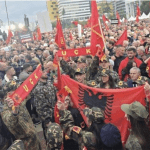TIRANA, Sept. 19 – George C. Marshall European Center for Security Studies started Tuesday two conferences with the Adriatic Charter nations _ Albania, Croatia and Macedonia _ on countering corruption, organized crime and illicit trafficking and their European Union and NATO integration efforts. The Center located in Garmisch-Partenkirchen, Germany, collected some 40 senior representatives to work Sept. 19-21 on corruption, organized crime, illicit trafficking and border security, necessary actions against them, their contribution to terrorist activities and the steps to counter ideological support for terrorism, according to a statement.
The second conference Sept. 21-22 will promote regional and inter-ministerial cooperation along the Euro-Atlantic integration discussing lessons learned by new NATO and EU members; and developing proposals for the way ahead. The three nations have signed the Adriatic 3 Charter, a U.S. initiative outlining a common military strategy and promoting regional cooperation, looking forward to being invited to join NATO probably at the 2008 enlargement summit. The three countries have sent small army units to Bosnia, Afghanistan and Iraq. “What do we need to do to collectively make this world a better place, a safer place, a place that is more enjoyable, more stable, more secure for us and for our families? We at the Marshall Center are focused on those areas with you.
You are part of our partnership, which is so very important in our working together for the future,” said Center head John Rose. The center is named and created from Gen. George C. Marshall best-known as the architect of a sweeping economic recovery program for postwar Europe. The Marshall Plan provided $13 billion to rebuild, stabilize and unite 17 war-torn nations _ including Germany and Italy, the very countries that had just been defeated by the U.S. and its allies.
“Theory and study is like a map. You can’t walk around without a map. Our studying, our looking deeply into strategic and security issues, will help Albania work toward the goal of EU integration. We are coming together to share our views and work together to promote this and other goals,” said Zegali, who was most recently at the Marshall Center in August to attend the Alumni Leadership Seminar. Zegali said that she envisions an “energized association present in the intellectual community.” She said that the association would like to cooperate in putting on a regional event, possibly on border security or public diplomacy.
Dr. John Rose, Director of the Marshall Center, located in Garmisch-Partenkirchen, Germany, said that he is pleased that the Albanian Marshall Center alumni have formed an alumni association, joining 20 others throughout Europe and Eurasia. “I am delighted that so many of you are here this evening, because it shows the strength of your desire to continue to learn and to continue to work together. That is so critical as you move forward.
U.S. Ambassador Marcie B. Ries said that the conference was very timely for the Adriatic Charter countries. “It has been an exciting and promising year in the NATO membership process, filled with high-profile visits and meetings, including Vice President Cheney’s participation in the Dubrovnik gathering last spring,” she said. “NATO is a community of values, and one of the most important values its members share is respect for the rule of law and the importance placed on accountable, transparent government institutions. This underlies NATO’s strength and lends credibility and legitimacy to the work it does, such as peacekeeping, humanitarian work, and fighting terrorism. Ries said that there was also a need for state agencies equipped to combat organized crime and illicit trafficking that are accountable to government and play a vital role. “It is only with such a culture in place that corruption can be rooted out, and that economic development and the foreign investment that is so critical to it can truly move forward.
The existence of corruption allows organized crime and trafficking to flourish, and the existence of these phenomena, in turn, directly affects the prospects for regional security. Your governments have made great progress in these areas, but work certainly remains. Since crime and trafficking transcend national borders, close collaboration and dialogue among the Adriatic Charter countries and their neighbors is critical. I hope that some of the people you meet here today will be your close collaborators in the future. One of the most important things you will be doing is sharing your best practices. “She said all those countries should do a hard work of dismantling criminal networks and creating a strong culture of respect for the rule of law must be done by you. “We regard and have always regarded the people of the Balkans as sharing our values of freedom, human rights, and democratic governance. As such, we are committed to the goals of security, stability, democracy, prosperity and of course NATO and EU membership for the entire Balkan region, and we will continue to work in this direction with our allies.”
Marshall Center holds conferences on security and integration of Southeastern Europe

Change font size:









